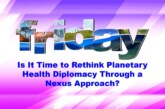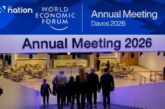
UN Member States agreed a new statistical framework on Wednesday that takes into account the contributions of nature, when measuring economic prosperity and human well-being.
Adopted by nations gathered at the UN Statistical Commission – the Organization’s highest decision making body for international statistics standards – the new economic and environmental statistical framework is expected to “reshape” decisions and policies for sustainable development and climate action.
“This is a historic step forward towards transforming how we view and value nature”, UN Secretary-General António Guterres said.
“We will no longer be heedlessly allowing environmental destruction and degradation to be considered economic progress.”
The new framework, called the System of Environmental-Economic Accounting – Ecosystem Accounting, will ensure that natural capital, such as forests, wetlands and other ecosystems are recognized in economic reporting.
Nature is ‘an asset’
It is a major step forward from the commonly used measure of gross domestic product (GDP), which dominated economic reporting for over seven decades, according to the UN Department of Economic and Social Affairs (DESA).
It recognizes that ecosystems deliver important services that generate benefits for people, and like economic assets, ecosystems are assets to be maintained. For example, forests help provide communities with clean water, serving as natural water filters with trees, plants and other elements that absorb pollution before it reaches streams, rivers and lakes.
In the past, we have always measured our progress in terms of the market value paid for the goods and services we produce and consume, said Elliot Harris, UN Chief Economist, explaining that nature’s value was never taken into account.
Nature was treated “as it it was free and limitless” and degraded without even knowing the value lost, he added.
Counting nature and the economy together and in the same framework “will allow us to see how our economic activities affect nature, and how the presence of nature affects us as individuals, societies and species”, Mr. Harris said, adding that by doing so, we can chance our activities “to achieve prosperity without damaging or destroying nature in the process”.
‘Game changer’ for climate action
Similarly, Inger Andersen, Executive Director of the UN Environment Programme (UNEP), applauded the new framework as a “game changer”.
“By highlighting the contribution of nature, we now have a tool that allows us to properly view and value nature. It can help us bring about a rapid and lasting shift toward sustainability for both people and the environment”, she said.
The framework is expected to underpin discussions and decisions at two major upcoming climate conferences later this year, the 15th session of the Conference of the Parties (COP15) to the Convention on Biodiversity, in Kunming, China, and the 26th session of the Conference of the Parties (COP26) to the UN Framework Convention on Climate Change, in Glasgow, the United Kingdom.
As governments get ready to agree and implement a framework that will re-craft the relationship with nature, the statistical framework will provide “an impetus for an accurate accounting of the value of biodiversity”, Elizabeth Maruma Mrema, Executive Secretary of the Convention on Biological Diversity, added.
“In so doing, it is a step towards sustainable development”, she said.
Post Source: UN NEWS



